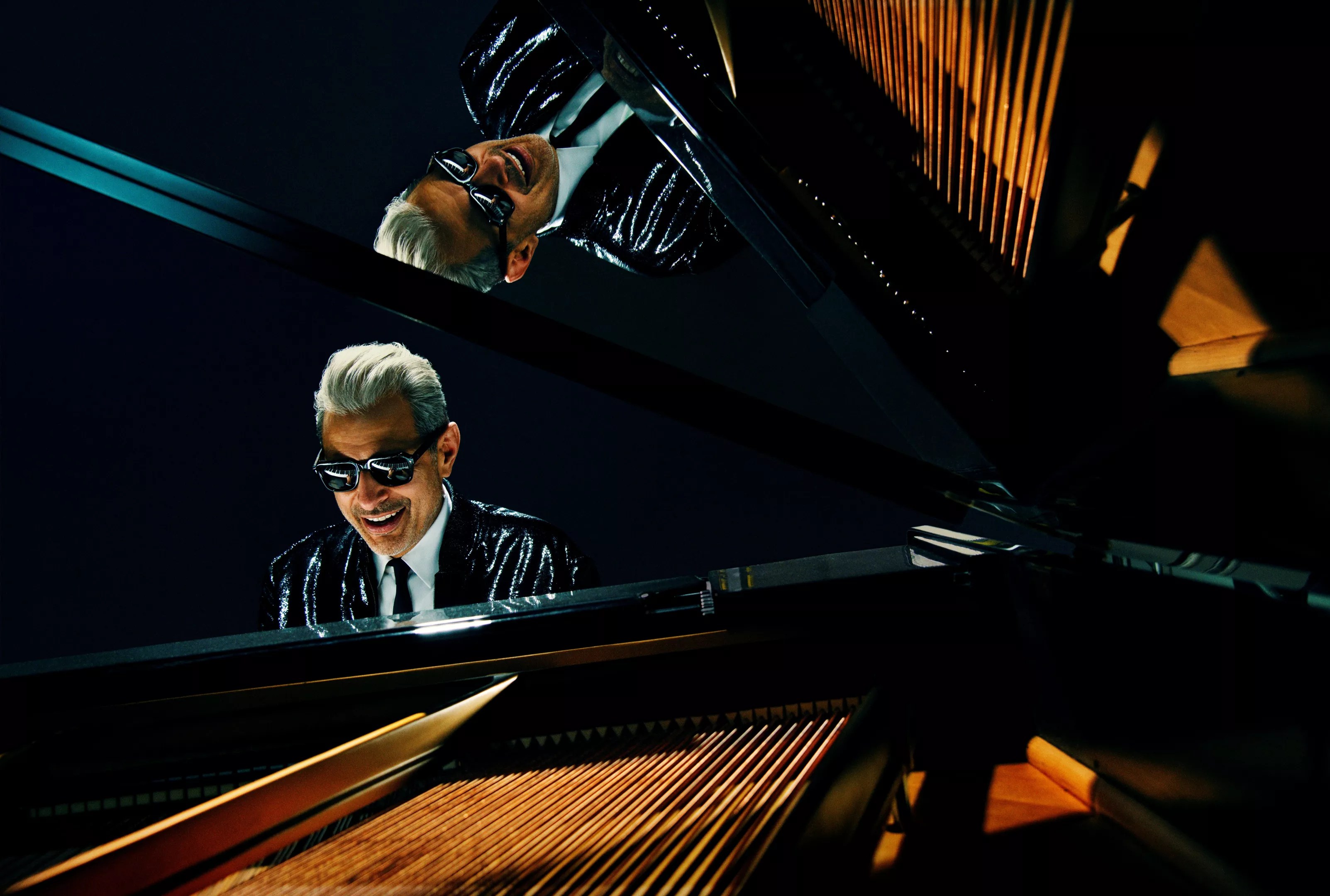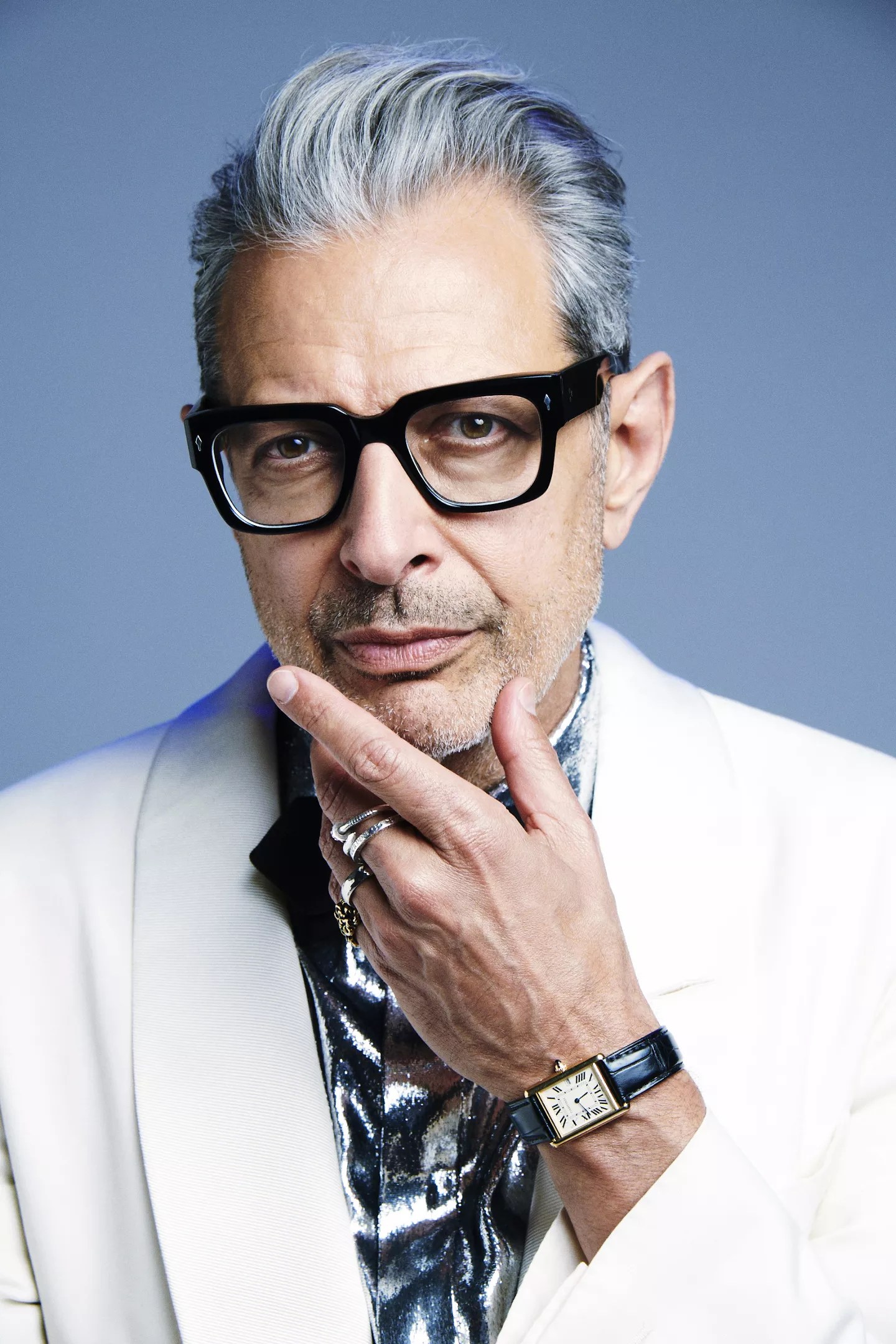
Pari Dukovic

Audio By Carbonatix
Jeff Goldblum is famous for many things: Iconic acting roles in “The Fly” and “Jurassic Park.” Being impossibly handsome and stylish at 72. Having an illegal amount of charisma and an infectious joie de vivre.
What he’s perhaps less known for is his decades-long career as a jazz pianist, specifically as a member of the Mildred Snitzer Orchestra, a Los Angeles-based ensemble that travels the world and has released three studio albums, including 2025’s “Still Blooming,” a collection of midcentury standards with guest vocals by the likes of Scarlett Johannson and Goldblum’s “Wicked” co-stars Ariana Grande and Cynthia Erivo.
The Mildred Snitzer Orchestra will perform two concerts each night on Sept. 1 and 2 at the Musical Instrument Museum. In advance of the shows, Goldblum spoke with Phoenix New Times about his origins as a musician, the “Wicked” global media blitz, the true identity of Mildred Snitzer, and much more.
(This interview has been edited for length and clarity.)
Phoenix New Times: So nice to meet you. Well, we’ve actually kind of met before and I have quite a bone to pick with you, I regret to say.
Jeff Goldblum: Oh, I’m so sorry. Well, I’m prepared. I’m frightened, but I’m prepared. Go ahead.
In 2019, you visited Phoenix Fan Fusion and you spiritually married everyone in the panel audience that day. And I was there, and six years, Jeff. You don’t call, you don’t write. This is a marriage in name only, and I’m upset about it.
Yes, we, we were married, but it was spiritual. That means the calling and that stuff is unnecessary. Our union is eternal, transformational. And even beyond the cosmic, you know, nuts and bolts, we’re totally, totally bonded. So I’m sorry and any feelings are totally understandable. And I can accommodate any of your feelings. But, uh, just to remind you, we are in fact, deeply bonded.
Well, that’s good. So let’s talk about your concerts coming up in Phoenix. I’ve told many, many people – friends, family, people in the grocery line – that I was going to get to speak with you, and I found that a goodly portion of them did not know that you were also an accomplished jazz musician. So tell me about that. How did you get into music and into jazz specifically?
I’ll tell you everything I can, in a nutshell. I wanna be pithy. Let me see. Uh, I don’t know if I’m accomplished. I’m a humble student still. And, what I did was, when in Pittsburgh, my parents, excellent as they were, exposed all of us four kids to music and culture of one kind or another. And, they gave me piano lessons. And I was a bad student at first. I didn’t know the joys of discipline yet. But when Tommy Emmel, who’d come to the house once a week, gave me a couple of jazz arrangements, specifically “Alley Cat and then “Stairway to the Stars” and a couple other things. It really got to me. There was something in me that just jived with that. And I vowed I started to sit down and practice as much as I needed to to learn to play that stuff.
And that’s what happened. And then my mom had some fake books now called “The Real Books,” which are the jazz compilation of jazz lead sheets with chords and the melody. She had a bunch of those. So I started to fool around with those. And then my parents found a teacher in Pittsburgh named Frank Cunimondo. If you look him up, I’ve played with him recently and talked with him. He is in his 90s now. We went over to his house ’cause he was a jazz guy then, and was playing around clubs and recording then. And we did a gig in Pittsburgh recently and I played with him. But anyway, I’d go over to his house and learned more about improvisation. And then, even though I’d gotten the acting bug and decided that was gonna be my career, I started to call cocktail lounges around Pittsburgh and try to wheedle my way into a job, which I got a couple of.
And so I started to play, and then when I went to New York, I kept a piano in my apartment as I was studying, acting and getting early lucky breaks there, I’d play and wound up playing with a couple of musicians and then I’d sneak it into a movie or two – “The Fly,” “Earth Girls Are Easy.” And then about 30 years ago I started to play out and about here in Los Angeles. And it grew.
That’s fantastic. That was really interesting when you mentioned the joys of discipline. What are the joys of discipline?
I’ll bet you know it better than I do. That even though you may have natural gifts like yourself, it’s only when you put in those 40,000 or 100,000 hours, whatever they say, of work, that it allows itself to develop. As we’re teaching our kids, they’re 8 and 10 now, they take piano lessons and are doing a bunch of other stuff that, when things are hard and you don’t necessarily feel like doing them, it’s the good habits that you make every day. And, you know, getting yourself in hand and making yourself practice.
And I still do it. I practiced today for an hour, as I do every day. And that’s the thing that pays off. Even Sanford Meisner, my acting teacher, said, there’s no particular secret greater than continuity of digging. That’s how you get the results. You just continue to dig and make good habits around your work and your work ethic.
So who is Mildred Snitzer, of the Mildred Snitzer Orchestra?
Mildred Snitzer, of course, was a real lady who was a friend of my mom, Shirley Goldblum. And she would come over once a week and they’d have lunch, and she was a kind of a free-spirited, uh, iconoclast, I think is the word.
And she’d get down on the floor and do stretching exercises and yoga exercises, or whatever it was in the early ’60s or something. And, when we were playing one of the gigs early on, trying to stay underneath the radar, one of the gigs at the Hollywood Bowl – in fact, it was the Playboy Jazz Festival – said, “Hey, we’re gonna put you in the program. You gotta have a name.” In a moment, I thought of that. I thought that was a cute and funny name. And I like that lady. And “orchestra” is a kind of, a little whimsical. And it stuck. That’s our name all these years. And then she showed up. She lived to be 104. Wow. And she showed up at one of our gigs in California and wearing a sequined gown and was rocking out to our music. And I think she was happy about it.
Do you have any impression of the split between the people who come to your shows for the music and the people who come for you?
Oh, you know, there seems to be a kind of a blending. It would be difficult to paint with a broad brush. They’re from all walks of life. I’ve done a lot of movies and different people like different things. And so there are all sorts of different types. We get every manner of homo sapiens.
That’s wonderful. What do you think about when you’re performing music?
Well, like people report, I have found moments of being in the zone, as some people describe it. Thought sort of falls a little onto the back burner or disappears for a moment.
And being so present and so attentive to what your acting partners, in the case of acting, or musician cohorts are doing, and surprising you with in the jazz way that you’re totally there and you’re not thinking about the laundry list or lunch or anything, but what you’re doing and the joy of being in the music and sharing the music and then inventing as best you can, the answer or the conversation with them for the ears of the audience. It’s a very, mmm, intoxicating kind of experience.

Iconic actor and musician, Jeff Goldblum
Pari Dukovic
I’ve talked to a number of multi-hyphenate performers and I ask them, “What do you like better? A or B?” And I find that a lot of them say, “Well, when I’m on stage, I like being on stage best. When I’m writing or recording music, I like that best.” Would you say the same for acting and music?
Yes. I hate to be boring or conventional or unsurprising, but, you know, yeah. That they all overlap a little bit. It’s not as if I do, you know, beekeeping and jazz. Jazz is obviously, conspicuously, a little bit like some of the acting that I do. And recording, of course, is not unlike, is just adjacent to playing live. There may be, you know, little distinct distinctions here and there, but when I’m working, I’m enjoying it to no end in ways that are similar, like other people say.
I know you’re just a couple of months away from going back into the publicity whirlwind of “Wicked: For Good. How do you prepare for a global media blitz like that?
Well, I’ve sort of, you know, spent a lot of my many hours in my life, just like when you get a pilot’s license, I think you have to clock some hours of doing that kind of stuff, which I have. But this is a special and unique experience, to be in that movie, you know, this one following the first one and the first one following the 20-year phenomenon, which was that stage show, which enthralled so many people. I just relish it, you know, and it’s a way of spending more time (with the cast) than even we did when we were shooting.
What can people expect at your Phoenix shows?
Well, that’s a good question. It’s always a surprise that we’ve prepared. I know already kind of the set list. And, uh, there’ll be maybe a surprise singer with us that I don’t wanna spoil. So, me, I’ll be doing my best. And I’m proud to show you what I’ve developed and our roster of guys are just spectacular. So you’re gonna see me playing, but enjoying them to no end as I play with them. And listening to them do surprising and improvisational things, ’cause jazz is improvisation somewhat. And then I am always interested in seeing who shows up. So I may, you know, do a little extemporizing, chatting with the audience and get the lights turned on, see who’s there, and see if I know anybody and see if they have any questions and if I have any questions for them. And we get into it, and I play some games with them. I like to play some trivia games, uh, here and there. I’ve been known to do that. So that kind of thing.
Jeff Goldblum and the Mildred Snitzer Orchestra: 6 and 8 p.m. Monday, Sept. 1, and 6:30 and 8:30 p.m. Tuesday, Sept. 2. MIM Music Theater, 4725 E. Mayo Blvd. Cost is $180.50-$220.50. Visit the MIM website for tickets.